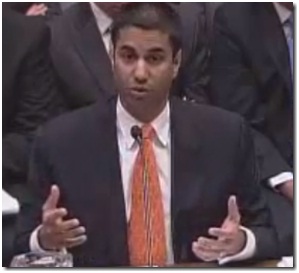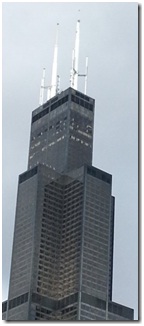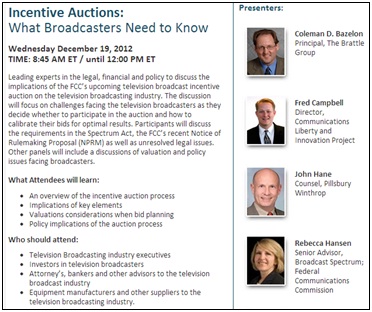Yesterday was a big day for spectrum in Washington DC (where a lot, but not all happens with regard to wireless regulation).
All the FCC Commissioners testified before the House Subcommittee on Communications and Technology. The Subcommittee wanted to hear from the Commissioners on the upcoming TV Incentive Auction (FCC TV Auction NPRM). Congress passed into law last February 2012 the TV Incentive Auction legislation (part of the Middle Class Tax Relief and Job Creation Act of 2012). The upcoming auction of TV stations – meaning the TV stations spectrum – is new and is very complicated. There are five primary goals of the auction: 1) making prime spectrum, the very best 700MHz grade, available for auction to mobile carriers, 2) funding Public Safety’s “FirstNet” “nationwide” and “interoperable” mobile network (making up for the failed “D” block private/public auction that took place 4 years ago), 3) money Public Safety state first responders, 4) money for public safety research, and 5) money for the Treasury.

Commissioner Ajit Pai, who has not failed to impress me, explained to the Subcommittee the auction complexity and the risks: “The broadcast incentive auction is inherently complicated; unnecessary complexities are likely to deter participation.” Commissioner McDowell agreed, calling the auction process: “the most complicated in world history.” The complexity of the reverse part of the auction, which is applied to TV broadcasters electing to sell and exit, is exemplified by the following statement in the NPRM pointed out by Commissioner Pai who suggests the statement could result in a placing a cap on the sale of the spectrum by paying for TV stations for spectrum and moving TV stations but not raising achieving the 5 goals:
“[W]e also will consider implementing a reserve price, or maximum payment, that would be made to broadcasters relinquishing spectrum usage rights. This reserve price could take the form of a maximum dollar payment to a broadcaster based on characteristics of the station such as population or viewership.” (NPRM para. 53)

The TV auction will take place in three parts:
1) a “reverse auction” setting minimum floor prices TV stations, wanting to exit the airwaves, would accept from bidders;
2) “re-packing” TV stations that do not wish to sell, meaning “packing” two or more TV stations into once over the air “channel” (like sharing a hotel room – it can work of course); and,
3) a “forward auction” for mobile bidders bidding for the spectrum.
After 60 years, TV stations will be paid by the government to sign-off “the air” permanently. This is big.
Selling Guard Bands. One controversy is the FCC proposal to not sell the guard bands. While all the Commissioners supported the goal of raising $7 billion from the auction for Public Safety’s FirstNet nationwide mobile project, not all Commissioners supporting selling the 10MHz of “guard bands” off and giving up on unlicensed White Space spectrum.
White Spaces Supported: In 2010, the FCC authorized the use of unlicensed White Spaces spectrum using the spectrum freed up by the first Digital TV move. This same spectrum is now under the threat of being sold and licensed. Congresswoman Eshoo placed into the Congressional record a letter signed by 300 industry leaders supporting the use of unlicensed White Spaces spectrum. Congressman Waxman explained the use of unlicensed “White Spaces” spectrum. He supported the FCC auction NPRM to create 10MHz guard bands for White Spaces calling it “smart spectrum policy.” Chairman Walden supported selling off the guard bands to produce a lot for Washington DC. Congressman Eshoo pointed out the the Subcommittee was not the budget committee but was tasked with keeping the broadband law “on track” rather than simply raising revenue for the Treasury.

Comments on the TV Incentive Auction NPRM are due on January 25, 2013.
Chairman Genachowski mentioned during the hearing that the FCC was participating in conferences and webinars to educate broadcasters.
TMCNet, Crossfire Media, and Carl Ford are hosting 3 hour webinar on the TV Incentive Auction next Wednesday, Dec. 19, 2012. There will be a strong panel of attorneys, economists, current and past regulators. The panels will address the NPRM legal issues, valuation issue, and policy issues.
Webinar Speakers include former FCC Commissioner Harold Furchtgott-Roth, Senior Fellow, Hudson Institute ; Rebecca Hanson, Special Advisor, FCC; Coleman Bazelon, The Brattle Group; Fred Campbell, Communications Liberty and Innovation Project; Armand Musey, Summit Ridge Group; Marty Stern, K&L Gates; Mark Fratrik, BIA/Kelsey; Trey Hanbury, Hogan Lovells; Daniel Kirkpatrick, Fletcher, Heald & Hildreth; John Hane, Pillsbury Law; Brian Madden, Lerman Senter, Preston Marshall, ISI, and yours truly, Barlow Keener, Keener Law Group.
Edited by
Brooke Neuman  QUICK LINKS
QUICK LINKS